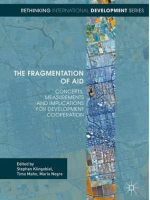Analyzing sources of aid fragmentation
A consequence of the proliferation of actors and cooperation approaches and the persistently independent and uncoordinated character of donor decisions, aid fragmentation is often associated with negative outcomes such as the unnecessary duplication of activities, increased administrative costs for aid recipients, and diminished transparency and accountability. However, the diversification of actors and approaches can also have positive effects such as increasing contributions to development goals and the choices available to recipients.
The Fragmentation of Aid: Concepts, Measurements and Implications for Development Cooperation, edited by Stephan Klingebiel, Timo Mahn and Mario Negre, provides an overview of analytical approaches to studying fragmentation, drivers of fragmentation trends, and possible avenues for addressing fragmentation challenges.
In his contribution to the volume, Erik Lundsgaarde examines diverse bureaucracies within OECD-DAC donor countries to illustrate the two sides to pluralism in development cooperation, highlighting differences in priorities and practices among ministries and the prospect of enlarging the scope of expertise and policy networks addressing development challenges.

